Think green: a sustainable revolution. And Pedrali proves it. Sustainable design, in fact, is the ultimate purpose of every activity aimed at reducing our impact on the environment. Designing with nature is about minimising the negative impact of the design process and generating high-quality products that are able to withstand the test of time, in terms of style and performance, while putting the health and comfort of people first. In line with this philosophy, Pedrali has launched its first collections made entirely from a recycled plastic material. A new material made 50% from plastic material post-consumer waste and 50% from plastic material industrial waste. An extraordinary revolution has enabled the 100% Made in Italy company to achieve yet another important milestone in its quest for environmental sustainability.
Plastic material post-consumer waste comes from products that have been used and then duly recycled by consumers, such as plastic bottles or food packaging. As for the use of plastic material industrial waste, this is not new to Pedrali, which has always reintegrated part of its own industrial waste back into the production process. The industrial element of the company’s new 100% recycled material comes from plastic waste, containers and films.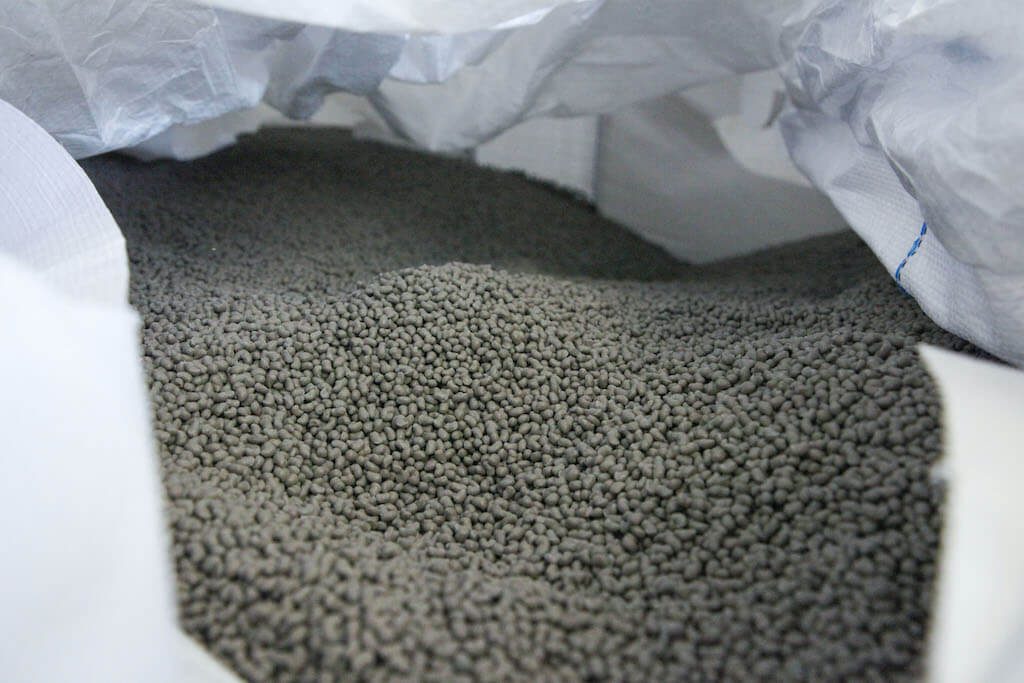 “This blend allows us to manufacture high-quality green products with excellent mechanical performance. Obtaining 50% of this material from post-consumer waste means selecting, sorting and recovering a material that would otherwise be discarded. Instead, by conducting precise tests and analyses, we can create the ideal raw material for use in furniture,” explains the company’s joint CEO, Giuseppe Pedrali. Pedrali is an Italian company producing modern furniture for the contract and residential sectors, founded in 1963 by his father Mario.
“This blend allows us to manufacture high-quality green products with excellent mechanical performance. Obtaining 50% of this material from post-consumer waste means selecting, sorting and recovering a material that would otherwise be discarded. Instead, by conducting precise tests and analyses, we can create the ideal raw material for use in furniture,” explains the company’s joint CEO, Giuseppe Pedrali. Pedrali is an Italian company producing modern furniture for the contract and residential sectors, founded in 1963 by his father Mario.
Pedrali has identified 50% of post-consumer waste as the ideal blend to guarantee high-quality products featuring the high resistance and durability levels required of contract furniture, given its substantial and prolonged use.
To ensure these properties, the furniture made from the new 100% recycled material is subjected to resistance tests to prove they can withstand prolonged exposure to light and temperatures between +50°C and -10°C without effects. Moreover, the furniture’s antistatic finishes are easy to clean, to maintain, and – more importantly, given the ongoing pandemic – to sanitise and disinfect.
All the products made from this new sustainable material share a characteristic grey hue, a neutral colour chosen to even out and conceal any imperfections typical of recycled materials. Given the name of “Recycled Grey”, the products are marked with the pad-printed inscription “100% recycled”, to emphasize their eco-friendliness.
REMIND designed by Eugeni Quitllet
One of the two new products made from this new material is the Remind “Recycled Grey” chair, designed by Eugeni Quitllet. Drawing on the soft, sinuous curves of the wooden chairs of the late 19th century, reinterpreted in an innovative key, Remind’s sensual and romantic design has a completely new feel about it. Made from a monoblock of injection-moulded polypropylene, the transpiring seat and backrest contribute to the chair’s airy, lightweight appearance, as well as to its embracing comfort. Functional, versatile and relatively small, this chair is suitable for both outdoor and indoor use thanks to the combination of harmonious lines and a lightweight yet sturdy material.
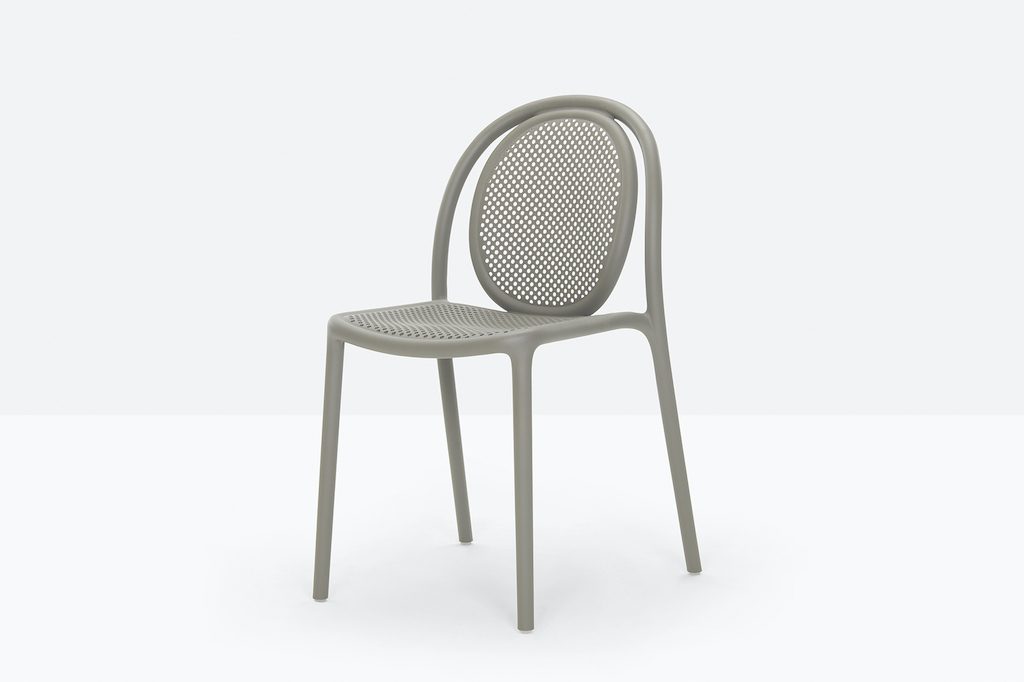
Remind Recycled Grey, design Eugeni Quitllet
Babila XL designed by Odo Fioravanti
Odo Fioravanti, instead, has created a “Recycled Grey” version of his Babila XL armchair. The inspiration behind Babila XL, the latest addition to Babila family, remains the alternating rational, straight lines with curves which create a link between the artificial world of industrial products and the natural, sinuous world of the human body.
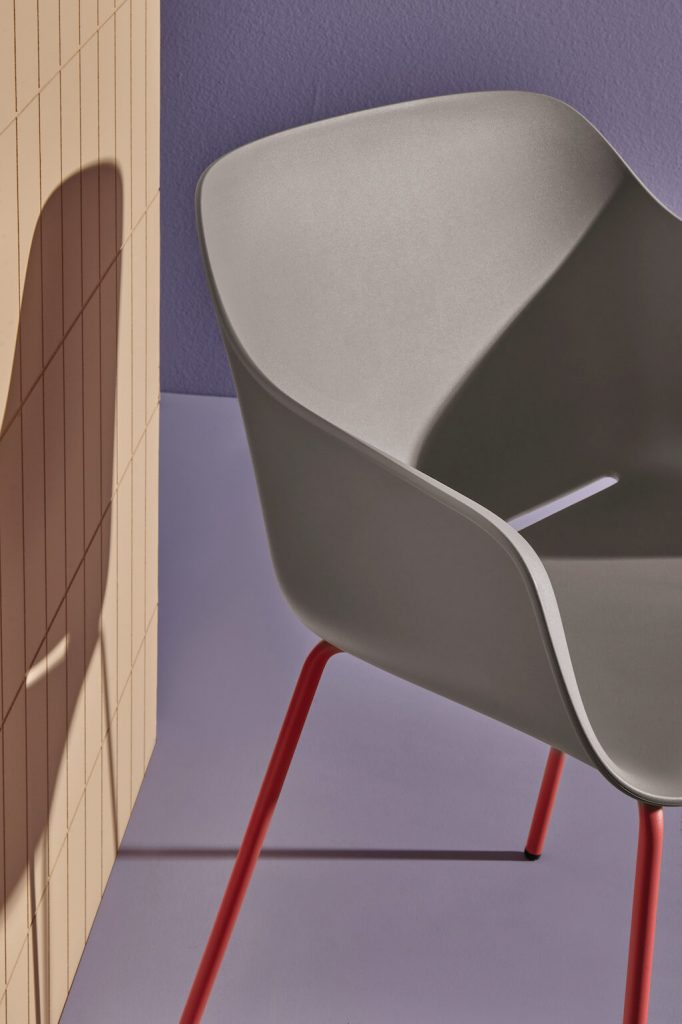
Babila XL Recycled Grey, design Odo Fioravanti, photo Andrea Garuti
Designed to offer greater seating comfort, the Babila XL armchair has a polypropylene shell that stands out for the large dimension of its seat and armrests. The 100% recycled body of the new Babila XL “recycled grey” may be fitted with wooden legs, making it a 100% green product. Finally, combining a plastic body with legs in different material such as wood or metal helps to ensure high-quality performance and likewise, Pedrali is renowned for combining different materials, particularly metal, plastic material, wood and upholstery.
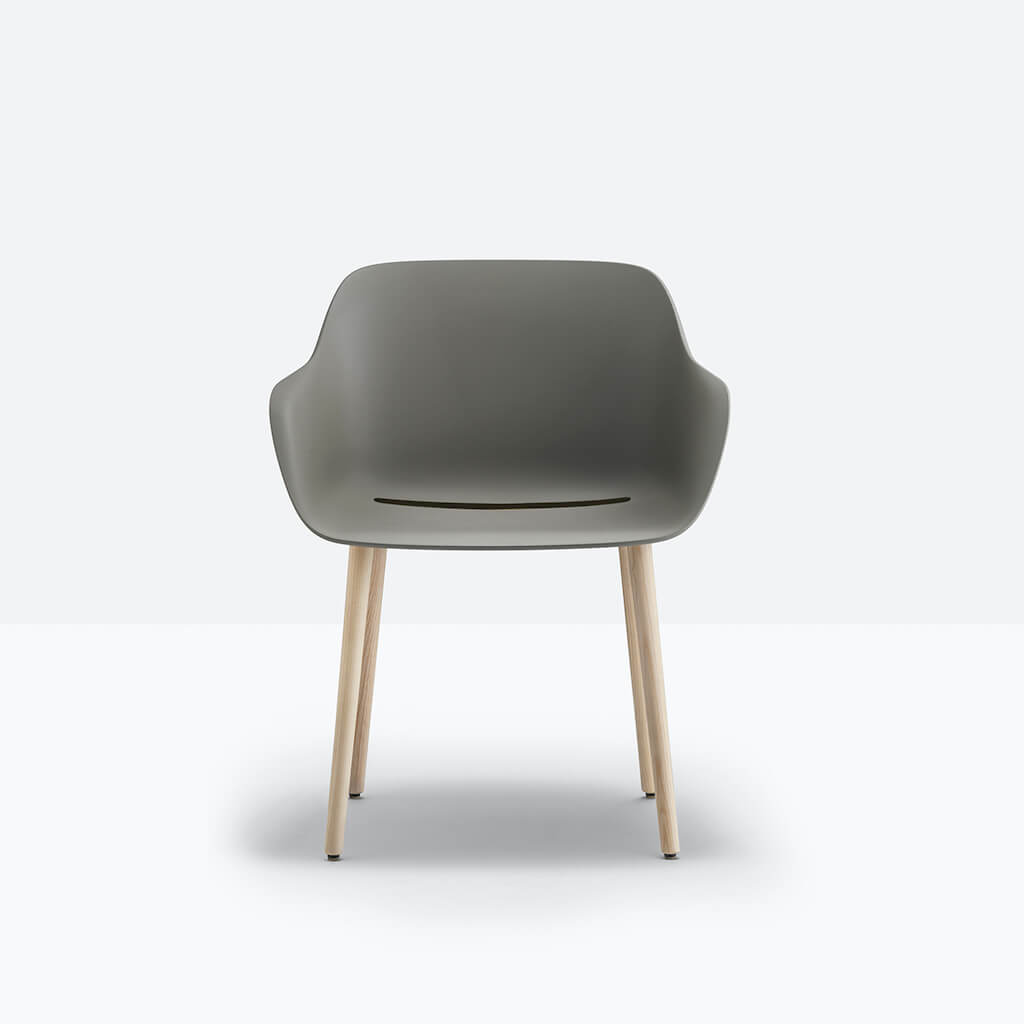
BabilaXL Recycled Grey, design Odo Fioravanti
This is just another step in Pedrali’s ongoing journey towards environmental sustainability, alongside planning – during both the design and the production phase – the optimised use of raw materials, the rationalisation of resources, the reuse and/or recycling of waste, and controlling emissions. “We produce everything in-house, in our production plants at Mornico al Serio (near Bergamo) and at Manzano (near Udine). This allows us to oversee the entire production process, using the latest-generation machinery and equipment, as well as high quality, sustainable materials,” says the company’s joint CEO, Monica Pedrali, affirming Pedrali’s respect for the environment as a well-established practice rooted in sustainable industrial processes. “The purpose of the sustainable philosophy that my brother Giuseppe and I are pursuing by converting industrial and post-consumer waste into raw material is to safeguard the planet, in line with the principle of circular economy aimed at eliminating waste.”
Last year, Monica Pedrali took part in the international conference “Design for Sustainability: bridging Italian and German creativity for sustainable development”, held at the Italian Embassy in Berlin, which inaugurated the European Sustainable Development Week. The conference dealt with sustainability, not just in terms of designing products but also from the point of view of optimising production processes and exploring new methods of production, distribution and collaboration between different industry stakeholders. Pedrali’s participation is indicative of its full endorsement of the European Community’s 2030 goals.
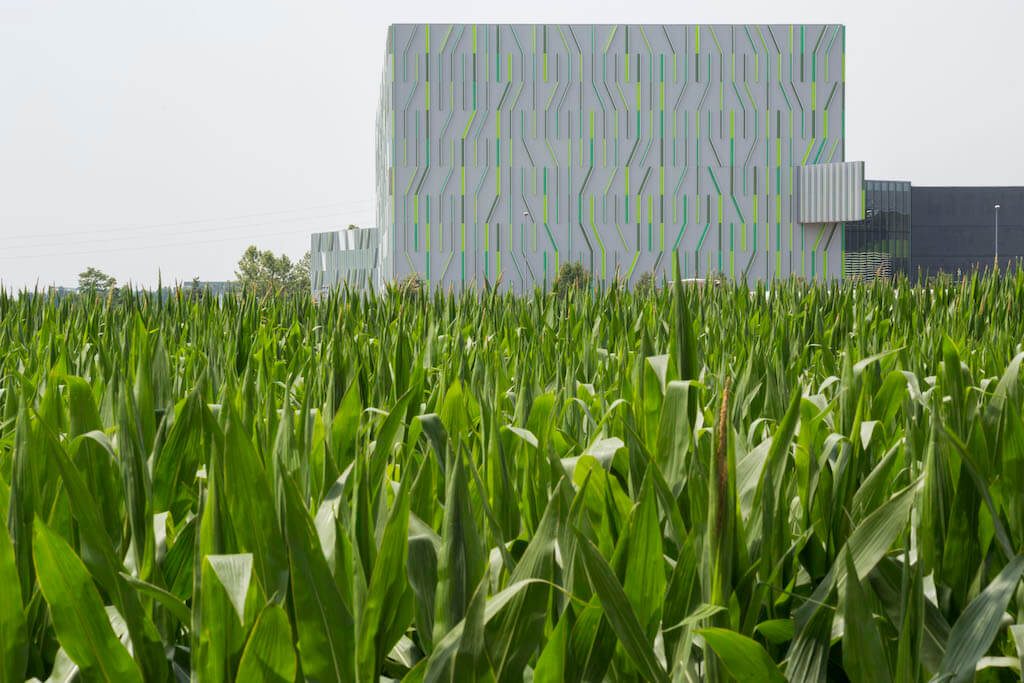
Pedrali, photo Filippo Romano
Among the certifications, included UNI EN ISO 9001:2015 for its quality management system and UNI EN ISO 14001:2015 for its sustainable environmental management, which is extended to every phase of the production process, another important achievement lies in having measured Pedrali’s Carbon Footprint, calculating the total amount of greenhouse gas emissions (GHG) caused both directly and indirectly by the organisation in a given time span. At a time characterised by excessive exploitation of natural resources, committing to social responsibility is not just about making “green” choices concerning production and the ethics of a company’s products; but it is about making environmental sustainability a core element of the company’s corporate culture, and a key medium-to-long-term business objective.
Pedrali
Pedrali exports to more than 100 countries worldwide and its furniture nurtures deep-rooted values such as respect for tradition, a pioneering approach to innovation, and the continual pursuit of beauty. The collection results from meticulous research aimed at creating functional and versatile industrial design products in metal, plastic materials, wood and upholstery, which are often combined. Seating, tables, furnishings and lamps are all exclusively manufactured in Italy, combining tradition and innovation, engineering excellence coupled with creative brilliance. The “100% Made in Italy” philosophy takes shape through internal production at the Mornico al Serio (Bergamo) headquarters, with its automated warehouse designed by architect Cino Zucchi, and at the Manzano (Udine) works. High quality and respect for the environment represent Pedrali’s long-established practice, as can be seen by the brand’s use of water-based paints made principally from plant-derived resins for wood products, and by the certifications ISO 9001 for quality management, ISO 14001 for sustainable environmental management, FSC™ C114358 for the use of timber from certified forests, and Greenguard for low emissions of toxic substances. Experimentation with production technologies, use of diversified materials and collaboration with numerous designers have resulted in Pedrali winning important awards, such as the Compasso d’Oro ADI for its Frida chair. Pedrali is a member of ADI, Associazione per il Disegno Industriale (Association for Industrial Design).
